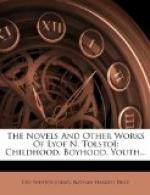aim in life was to annoy me.) Some where I have read
that, not infrequently, children of from twelve to
fourteen years of age—that is to say, children
just passing from childhood to adolescence—are
addicted to incendiarism, or even to murder.
As I look back upon my childhood, and particularly
upon the mood in which I was on that (for myself) most
unlucky day, I can quite understand the possibility
of such terrible crimes being committed by children
without any real aim in view—without any
real wish to do wrong, but merely out of curiosity
or under the influence of an unconscious necessity
for action. There are moments when the human
being sees the future in such lurid colours that he
shrinks from fixing his mental eye upon it, puts a
check upon all his intellectual activity, and tries
to feel convinced that the future will never be, and
that the past has never been. At such moments—moments
when thought does not shrink from manifestations of
will, and the carnal instincts alone constitute the
springs of life—I can understand that want
of experience (which is a particularly predisposing
factor in this connection) might very possibly lead
a child, aye, without fear or hesitation, but rather
with a smile of curiosity on its face, to set fire
to the house in which its parents and brothers and
sisters (beings whom it tenderly loves) are lying
asleep. It would be under the same influence
of momentary absence of thought—almost absence
of mind—that a peasant boy of seventeen
might catch sight of the edge of a newly-sharpened
axe reposing near the bench on which his aged father
was lying asleep, face downwards, and suddenly raise
the implement in order to observe with unconscious
curiosity how the blood would come spurting out upon
the floor if he made a wound in the sleeper’s
neck. It is under the same influence—the
same absence of thought, the same instinctive curiosity—that
a man finds delight in standing on the brink of an
abyss and thinking to himself, “How if I were
to throw myself down?” or in holding to his
brow a loaded pistol and wondering, “What if
I were to pull the trigger?” or in feeling,
when he catches sight of some universally respected
personage, that he would like to go up to him, pull
his nose hard, and say, “How do you do, old boy?”
Under the spell, then, of this instinctive agitation
and lack of reflection I was moved to put out my tongue,
and to say that I would not move, when St. Jerome
came down and told me that I had behaved so badly
that day, as well as done my lessons so ill, that I
had no right to be where I was, and must go upstairs
directly.
At first, from astonishment and anger, he could not
utter a word.
“C’est bien!” he exclaimed eventually
as he darted towards me. “Several times
have I promised to punish you, and you have been saved
from it by your Grandmamma, but now I see that nothing
but the cane will teach you obedience, and you shall
therefore taste it.”
This was said loud enough for every one to hear.
The blood rushed to my heart with such vehemence that
I could feel that organ beating violently—could
feel the colour rising to my cheeks and my lips trembling.
Probably I looked horrible at that moment, for, avoiding
my eye, St. Jerome stepped forward and caught me by
the hand. Hardly feeling his touch, I pulled
away my hand in blind fury, and with all my childish
might struck him.




